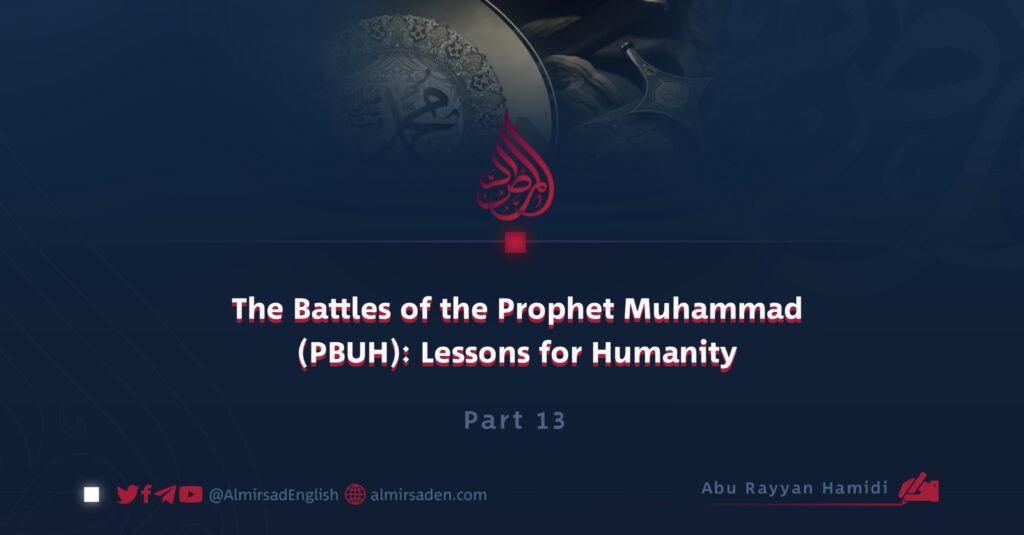Part 13
Abu Rayyan Hamidi
The Disposal of the Polytheists’ Corpses in the Pit
Following the decisive Muslim victory at the Battle of Badr, the Messenger of Allah (PBUH) ordered that the corpses of twenty-four slain Quraysh soldiers be cast into a pit. It was his noble practice to remain on the battlefield for three days following a major engagement. On the third day, the Prophet (PBUH) approached the edge of the pit and addressed the fallen by name and lineage, declaring:
“Have you found what your Lord promised to be true? For indeed, I have found what my Lord promised me to be true.”
Upon hearing this, Umar ibn al-Khattab (RA) asked, “O Messenger of Allah, are you speaking to lifeless bodies?”
The Prophet (PBUH) replied:
“By the One in Whose Hand is my soul, you do not hear my words better than they do, but they cannot respond.”
Following this solemn moment, the Prophet (PBUH) and his companions departed, leaving the field of Badr behind.
News of Quraysh’s Defeat Reaches Makkah
In the aftermath of their defeat, the scattered remnants of the Quraysh army wandered aimlessly through the deserts and valleys, seeking a path back to Makkah. The first to return was Husayman ibn ‘Abdullah, who delivered the grim news of defeat. Shock and grief spread swiftly across the city. The Quraysh initially wept bitterly for their fallen, but out of pride and fear that the Prophet (PBUH) might take satisfaction in their sorrow, they soon ceased their public mourning.
Among those who had remained in Makkah during the battle was Abu Lahab, one of the city’s most prominent and staunch opponents of Islam. The humiliation of Quraysh’s defeat struck him so deeply that even the weak and oppressed in Makkah dared to confront him. Seven days later, he succumbed to a disease known as ‘Adasa, a plague-like affliction regarded by the Arabs as a sinister omen, and died a miserable death. Out of fear and revulsion, no one approached his corpse. After three days, his sons, under public pressure, dug a pit and, using sticks from a distance, pushed his body into it and covered it with earth.
Such was the end of those arrogant oppressors who had tormented the vulnerable Muslims of Makkah with relentless cruelty and had spared no effort to extinguish the light of Islam. But divine justice ultimately overtook them, for they had been heedless of the might and vengeance of the Almighty.
Every street and home in Makkah was filled with mourning. The elite of Quraysh had been slain, their power shattered, and nearly every household had lost a relative. Sorrow overtook the city. But alas, if only the fallen had died as believers rather than as enemies of truth. Had they embraced Islam, their end might have been one of honor, not disgrace.
News of Victory Reaches Madinah
The news of the Muslim victory reached Madinah just as the Companions were burying Ruqayyah (may Allah be pleased with her), the noble daughter of the Prophet (PBUH) and the wife of Uthman ibn ‘Affan (RA). She had been gravely ill, and for this reason, the Prophet (PBUH) had instructed Uthman to remain in Madinah and not join the expedition to Badr. Thus, while Madinah rejoiced in the news of triumph, it also wept at the loss of one of its most noble women.
The Matter of War Spoils
Even before the Muslim army departed from the battlefield, disputes arose among the Companions regarding the distribution of war spoils. Those who had fought and pursued the enemy believed they were more entitled to the spoils. The group that had remained behind to guard the Prophet (PBUH) also claimed a share, while those who had collected the booty argued it was rightfully theirs.
This conflict was soon resolved by divine revelation. The Almighty revealed:
“They ask you about the spoils of war. Say, ‘The spoils belong to Allah and the Messenger. So fear Allah and set matters right among yourselves…'”
(Surah al-Anfal, 8:1)
This verse clarified that the division of war booty was to be carried out under the command of Allah and His Messenger (PBUH), and that the believers were to maintain unity and fear Allah in all matters.
Later, during the journey toward Makkah at a place called Safra, the Messenger of Allah (PBUH) distributed the spoils equally among all the soldiers. According to the opinions of Imam al-Bukhari and Imam Ibn Jarir, one-fifth (khums) was set aside as prescribed by Islamic law. Remarkably, no one objected. Every Companion accepted the Prophet’s decision wholeheartedly, fully satisfied with the justice of Allah and His Messenger.
Additionally, those who had not participated in the battle, either by direct command or with the Prophet’s permission, were granted a share of the booty. These included:
Uthman ibn ‘Affan, Talhah ibn ‘Ubaydullah, Sa‘id ibn Zayd, Abu Lubabah, Asim ibn ‘Adi, Harithah ibn Hatib, Harith ibn al-Simmah, and Khuwat ibn Jubayr (may Allah be pleased with them all).
The Execution of Two War Criminals
At Safra, two prisoners—Nadr ibn al-Harith and Uqbah ibn Abi Mu‘ayt—were executed for their long-standing and severe crimes against the Messenger of Allah (PBUH). These men had gone to extreme lengths to insult, slander, and physically abuse the Prophet (PBUH) during his years in Makkah. Their execution was carried out not in vengeance, but in accordance with justice. They had crossed every limit of enmity and had forfeited any claim to mercy. Their crimes against Islam were persistent and vicious.
While most of the captives were treated with clemency and later ransomed or released, these two individuals were executed at Safra due to the gravity of their crimes and their persistent hostility toward Islam and its Messenger.
